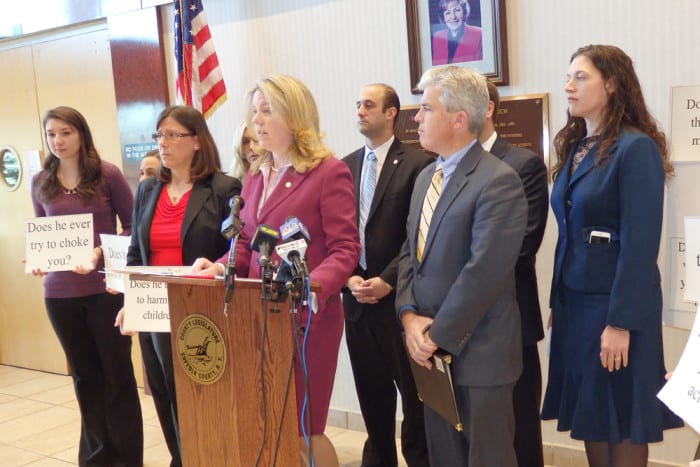Domestic violence reform passes Suffolk County Legislature

This story was last updated on March 25.
The Suffolk County Legislature stood united Tuesday as it approved a new bill that will change the way police and advocacy agencies approach domestic violence by taking a new look at different risk factors.
The bill, which County Executive Steve Bellone (D) said he will sign into law, emphasizes a three-pronged approach: directing county police to assign grades of recidivism risk to offenders, providing domestic violence victims with self-assessment opportunities, and linking them up with advocates to deliver more resources. County Legislator Kara Hahn (D-Setauket), who introduced the bill, plugged the measure alongside Bellone, Presiding Officer DuWayne Gregory (D-Amityville) and other Suffolk leaders just hours before the Legislature voted Tuesday evening, with 16 legislators in favor and one absent at the time of the vote.
“One out of four women in the United States will experience some type of domestic violence during her lifetime, and every year more than 1,500 of these women will be killed by their abusers,” Hahn said. “Key to addressing this issue is to realize that over half of domestic violence victims who are murdered, or are the victim of an attempted murder … did not accurately perceive his or her risk.”
According to the state Division of Criminal Justice Services, 38 domestic violence-related homicides have been reported in Suffolk County between 2009 and 2013.
The legislation plays off of a Portland, Ore., police initiative that assesses risk for intimate partner violence — an initiative that Suffolk police used on a limited basis. The 20-question assessment, lawmakers argued, helps victims see how much danger they are in while also linking them up with advocacy groups near them.
As far as the offenders go, Bellone and Sgt. Kelly Lynch, commanding officer for the Suffolk County Police Department’s Domestic Violence Bureau, said cops will use a new danger assessment tool to identify at-risk victims and assign a level of risk to previous offenders on a scale of one to 13, with the highest number meaning they are most likely to repeat an offense.
“This computer program automatically collects and analyzes data from internal police records and produces a score that will identify offenders who are most likely to ‘recidivate’ in domestic violence offenses,” Lynch said. “Domestic violence officers will use this tool to contact the victims and families who are associated with these high-risk offenders.”
Bellone called the legislation both a personal and professional endeavor for Hahn and described domestic violence as one of the most important issues facing the county.
“As the police are some of the first people to come into contact with victims of domestic violence, it is important that they have access to proven assessment tools and the most effective resources to best serve and protect victims,” he said. “This legislation will do just that.”
Laura Ahern, executive director of the Crime Victims Center at Parents for Megan’s Law, said the 20-question self-assessment will better identify certain risk factors, making violence more predictable and preventable. She said lawmakers must pay close attention to the victims of such crimes and help empower them to prevent future incidents.
“This is an enormous step,” Ahern said. “All three components of this bill empower domestic violence victims. The police department will then use objective means to assess, identify and help these victims.”






